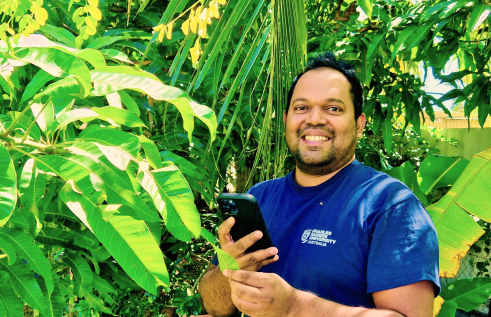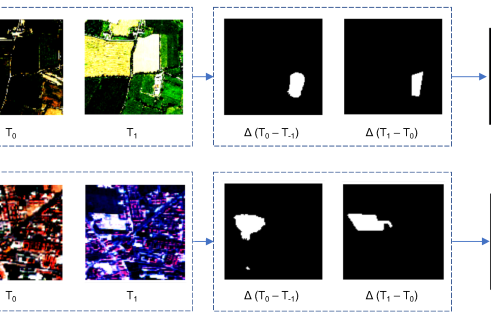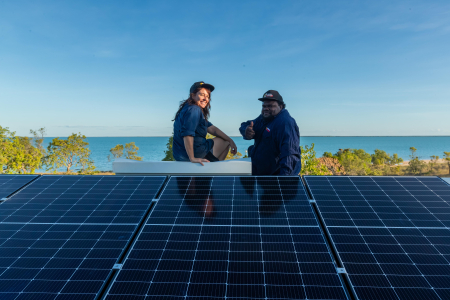Shining a renewable light on remote energy challenges
The innovative efforts to switch on renewable energy at remote Northern Territory communities will be discussed at a short film screening and panel discussion today at Charles Darwin University (CDU).
CDU, alongside First Nations organisations Original Power, Ngardara Collective, and First Nations storytelling agency GARUWA will screen Power to Country on Wednesday, a short film highlighting the energy issues facing many Northern Territory homeland residents.
The film focuses on Garrwa woman Shirley Simon, who was forced to leave her home at Mumuthumburru after the island’s power system failed, and the challenges she, her family and many others continue to face with a lack of adequate and affordable access to energy.
The screening will be followed by a panel discussion on sustainable power solutions for remote communities featuring Ms Simon and representatives from Original Power, Ngardara Collective, and GARUWA.
CDU Pro Vice-Chancellor Faculty of Science and Technology Professor Suresh Thennadil, who will be speaking on the panel, said finding long-term renewable energy solutions for communities was a significant research priority.
“Researchers across Charles Darwin University are dedicated to developing sustainable processes and products to address energy insecurity in the Northern Territory,” Professor Thennadil said.
“We are well-positioned in the Territory to provide the most effective solutions to one of our most pressing problems. The Northern Territory can be world-leading in its approach to installing affordable and efficient renewable energy, and the key to this is a multifaceted collaboration of science and community.”
Worimi woman Genevieve Grieves, who is the panel moderator, co-founder of GARUWA and supervising director of Power to Country, said the event was an opportunity to share knowledge and efforts to address this pressing issue.
“Less than 0.1 per cent of First Nations people in social housing have access to solar power, and the issue is in these communities that if you don’t have money to pay for power, you can lose access very quickly,” Ms Grieves said.
“This is a matter of life and death for people, because with climate change and rising temperatures, you can’t survive without access to power, which often also means no access to water.”
Also on the panel is PhD researcher and Djukun, Yawuru and Jaru-Kitja woman Cynthia Coyne, Yanyuwa man Ngardara Chairperson Conrad Rory, Garrwa man and Ngardara Cooperative Director Scott McDinny, Original Power Clean Energy Communities Coordinator Lauren Mellor, and Yanyuwa/Garrwa woman Annie Taylor.
First Nations Clean Energy Solutions is supported by CDU’s Energy and Resources Institute and the Research Institute for the Environment and Livelihoods.
The event begins at 11.30am on Wednesday, August 7 at CDU’s Casuarina campus.
Related Articles

Rooting out plant diseases: Are computers ready to run our farms?
Nature is still too complex for artificial intelligence (AI) modelling to be effective, but the tipping point is close, according to a new study that found the technology may still trip at the last real-world hurdle.
Read more about Rooting out plant diseases: Are computers ready to run our farms?
Tech on the treetops: How AI can protect forests
The Artificial Intelligence model was developed to detect changes in forest cover.
Read more about Tech on the treetops: How AI can protect forests
Volunteers protected Darwin wildlife for 50+ years, but new research suggests it’s time to stop winging conservation efforts
Volunteers have shouldered the burden of shorebird conservation in the Top End for more than half a century, but new research from Charles Darwin University (CDU) suggests it’s time for the government to take responsibility for all of the Northern Territory’s residents – including those with wings.
Read more about Volunteers protected Darwin wildlife for 50+ years, but new research suggests it’s time to stop winging conservation efforts
